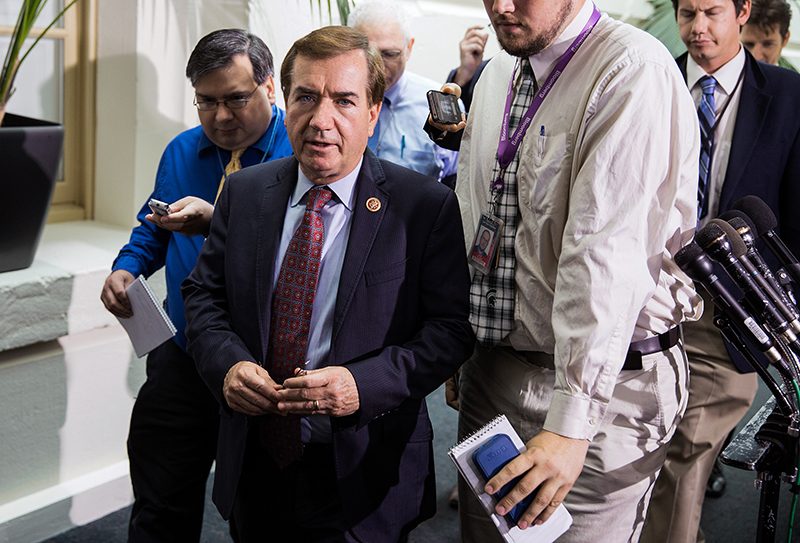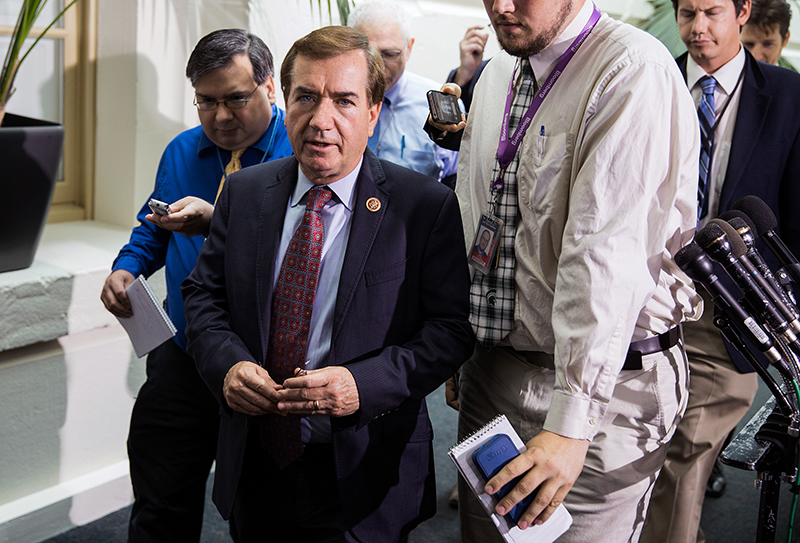A U.S. resolution condemning the oppression of Cambodia’s political opposition and human rights groups passed on Tuesday in Washington as the U.N. Human Rights Council convened in Geneva to highlight recent rights abuses in Cambodia and elsewhere.
Prime Minister Hun Sen’s “thuggish regime continues to crack down on his political opposition and other activists, arresting and beating those who oppose his rule,” Congressman Ed Royce, House Foreign Affairs Committee chairman, said on the floor before the vote.

“This systematic persecution of the government’s opposition completely undermines the legitimacy of upcoming local elections, as well as the country’s 2018 national elections,” said Mr. Royce, a California Republican and longtime critic of Mr. Hun Sen.
The U.S. House of Representatives’ resolution, updated since its May introduction to reference the July murder of political analyst Kem Ley and last week’s conviction of deputy opposition leader Kem Sokha, urges Mr. Hun Sen to end all “harassment and intimidation” of Cambodia’s opposition and drop all “politically motivated” charges against opposition lawmakers.
Meanwhile in Geneva, the U.N. Human Rights Council convened its 33rd regular session with an agenda that includes the presentation of reports outlining alleged human rights abuses in Cambodia, which will be discussed later this month.
In his introductory remarks, U.N. High Commissioner for Human Rights Zeid Ra’ad Al Hussein defended the U.N. body against what he described as frequent attacks from around the world in response to “credible allegations of violations” including prosecutions that appear politically motivated.
“Efforts to duck or refuse legitimate scrutiny raise an obvious question: What, precisely, are you hiding from us?” Mr. Al Hussein said.
The U.N. human rights office issued a statement last week expressing its deep concern over the “escalating atmosphere of intimidation of opposition politicians, their supporters, civil society, and peaceful demonstrators in Cambodia.” It also said the trial of Mr. Sokha had a “weak evidentiary basis” and “accompanying procedural flaws.”
The government responded by claiming that the U.N. was attempting to meddle in Cambodia’s internal affairs and interfere in its judiciary.
Council of Ministers spokesman Phay Siphan on Tuesday shrugged off the U.S. resolution, saying it would have no tangible impact on the Cambodian government.
“We don’t take that resolution seriously,” Mr. Siphan said, explaining that it was pushed through by a contingent of U.S. congressmen who supported the CNRP. “Cambodia has no obligation to abide by it.”
What many are calling suppression of opposition politicians in Cambodian was simply a matter of punishing criminals, he said.
“They have full rights and freedoms to do politics here, but we have a few politicians who abuse the law, so they are to sit in front of the court,” Mr. Siphan said.
Opposition leader Sam Rainsy, currently living in exile to avoid a two-year prison sentence, said that even if the CNRP had lobbied U.S. congressmen for the resolution, the American lawmakers had “acted according to their consciences.”
Asked if the congressmen behind the resolution were CNRP supporters, he replied: “No, all the concerned U.S. House Representative support democracy in Cambodia.”
Sophal Ear, associate professor of diplomacy and world affairs at Occidental College in Los Angeles, noted that the latest resolution lacked teeth.
“It’s about going on the record, a bit of political persuasion, and an attempt to influence foreign affairs,” Mr. Ear said in an email. “But there’s no bite. What do they propose to do? Nothing.”
A spending bill approved by the U.S. Senate Appropriations Committee in July proposes to make U.S. aid to Cambodia next year contingent on an end to the government’s harassment of the opposition and civil society. The bill has yet to reach the Senate floor.
Mr. Ear said measures laid out in another bill now being considered by the U.S. House of Representatives—which would allow the U.S. to freeze foreigners’ assets and ban their visas if they have committed gross human rights violations—could be far more effective.
“No more trophy U.S. visas to brag about on Facebook and shopping trips by the misses for Birkin bags and luxury goods; no more real estate buying sprees to launder ill-gotten gain,” he said. “It could be a real game-changer.”




